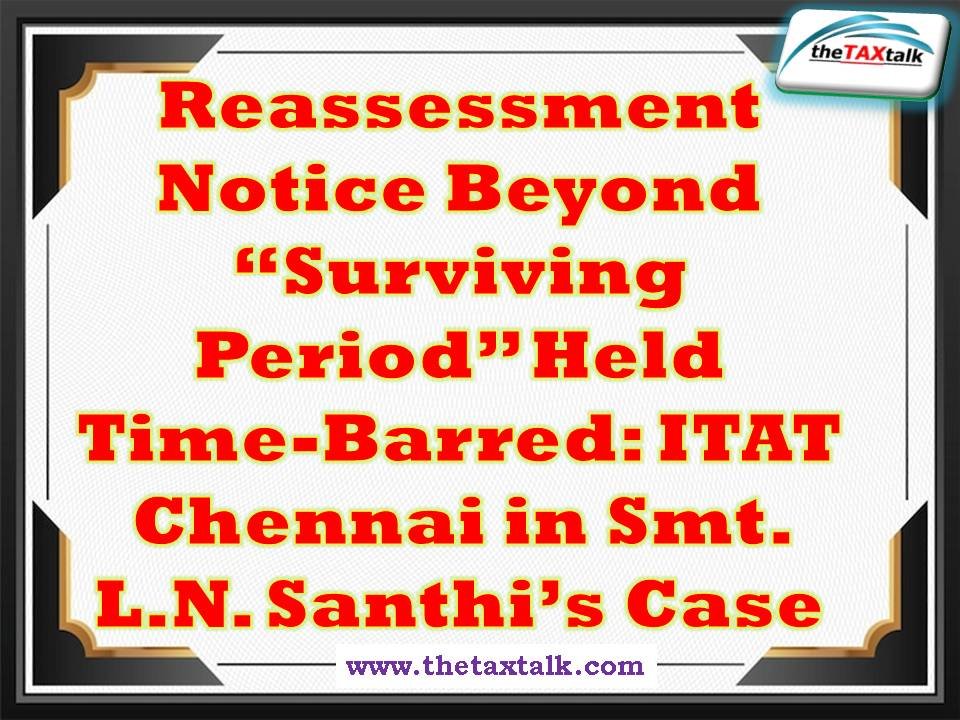![]()
Reassessment Notice Beyond “Surviving Period” Held Time-Barred: ITAT Chennai in Smt. L.N. Santhi’s Case
Introduction
In a landmark ruling, the Chennai Bench of the Income Tax Appellate Tribunal (ITAT) in ITA No. 3013/CHNY/2024–Smt. Lakshmi Narasimhan Santhi vs. ACIT-has quashed a reassessment order under the new regime, holding it as time-barred. This decision hinges on the principles laid down by the Hon’ble Supreme Court in Union of India vs. Rajeev Bansal (469 ITR 46), concerning the concept of the “surviving period” under the reassessment framework.
The appellant was represented by Shri S.R. Srikrishna, Chartered Accountant, while the Revenue was represented by Shri Kumar Chandan, Joint Commissioner of Income Tax (JCIT).
Factual Matrix
The assessee, Smt. Lakshmi Narasimhan Santhi, was one of eight co-owners of a property sold during Assessment Year 2013–14. A notice under section 148 (old regime) was issued on 30.06.2021-within the extended time limit provided under the Taxation and Other Laws (Relaxation of Certain Provisions) Ordinance, 2020 (TOLA).
Pursuant to the Hon’ble Supreme Court’s ruling in Ashish Agarwal (441 ITR 1), this notice was treated as a deemed notice under section 148A(b). The necessary material was provided to the assessee on 02.06.2022, and the reply was filed on 11.06.2022. Thereafter, a fresh order under section 148A(d) and a reassessment notice under section 148 were issued on 28.07.2022. The reassessment was completed on 24.05.2023 with an addition of ₹97.09 lakh towards long-term capital gain.
Key Legal Question
The crux of the matter was whether the notice under section 148 dated 28.07.2022-issued under the new regime-was valid in light of the “surviving period” concept laid down in Rajeev Bansal.
What is the “Surviving Period”?
In Rajeev Bansal, the Hon’ble Supreme Court clarified that:
- If reassessment notices issued between 01.04.2021 to 30.06.2021 (old regime) are deemed notices under section 148A(b),
- Then the Revenue must issue a fresh 148 notice within the balance period of limitation (“surviving period”)as it existed on 30.06.2021.
- Any notice beyond this period is time-barred, even if it complies with section 148A(d)’s timeline of one month.
Timeline of Events in the Case
| Sr. | Event | Date |
|
1 |
Original Notice u/s 148 (Old Regime, under TOLA) |
30.06.2021 |
|
2 |
Information shared by AO as per Ashish Agarwal |
02.06.2022 |
|
3 |
Assessee’s Reply |
11.06.2022 |
|
4 |
Order u/s 148A(d) and New 148 Notice |
28.07.2022 |
|
5 |
Computed “Surviving Period” |
7 days |
|
6 |
Last valid date to issue 148 notice |
23.06.2022 |
|
7 |
Actual issue date |
28.07.2022 |
|
8 |
Delay |
35 days (Time-barred) |
Arguments by Counsels
- Shri S.R. Srikrishna, CA(for the Assessee), argued that the new notice dated 28.07.2022 was clearly beyond the permissible “surviving period” as defined by the apex court. He relied heavily on para 114(g) & (h) of Rajeev Bansal.
- Shri Kumar Chandan, JCIT(for the Revenue), contended that the AO had acted in accordance with the CBDT Instruction No.1/2022 and the Ashish Agarwal judgment, and that the notice under section 148 was issued within the time permitted under section 148A(d)-i.e., one month from the end of the month in which reply was received.
Tribunal’s Findings
The ITAT Chennai Bench (comprising Shri George George K, Vice President, and Shri S.R. Raghunatha, Accountant Member) rejected the Revenue’s contention and observed the following:
1. The time limits prescribed under section 148A(d) are overriddenby the “surviving period” doctrine laid down in Rajeev Bansal.
2. The AO had only 7 daysafter the reply was received on 11.06.2022 to complete the process and issue notice, i.e., till 23.06.2022.
3. The actual notice dated 07.2022was beyond this outer limit, making the reassessment non-est and void ab initio.
4. Multiple precedents-including those from the Madras High Court (Thulasidass Prabavathi), Delhi HC (Ram Balram Buildhome), and ITATs-were cited to support the conclusion.
Judicial Precedents Referred
- Madras HC: Thulasidass Prabavathi vs. ITO
- Delhi HC: Ram Balram Buildhome Pvt. Ltd., Kanwaljeet Kaur & Ors.
- P&H HC: Kulwant Singh & Ors. vs. UOI
- SC SLP Dismissal: ACIT vs. Amit Jain
- ITAT Pune: Kolte Patil Developers, Pushpadevi Shivlal Rathi
- ITAT Mumbai: Nilanjana Arvinder Singh, Ramchand Jhamtani
- ITAT Raipur: Vinay Agrawal, Kachrulal Jitendra Kumar
Conclusion
The ITAT Chennai’s ruling in Smt. L.N. Santhi’s case has reaffirmed a crucial principle in tax law: timelines under the reassessment regime cannot be relaxed arbitrarily, even by procedural sections like 148A(d). The “surviving period” serves as a judicially recognized firewall against belated actions by the tax authorities.
This case will serve as a key precedent for many taxpayers caught in the transition between old and new reassessment procedures, especially for AYs before 2015-16.
In Summary:
If the final notice under the new regime is issued even a day after the surviving period ends-it’s invalid. No matter how genuine the Revenue’s intent.
The copy of the order is as under:


